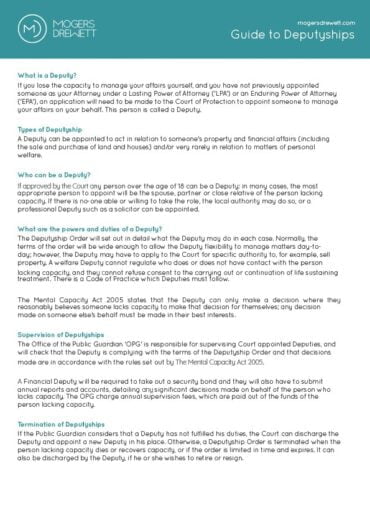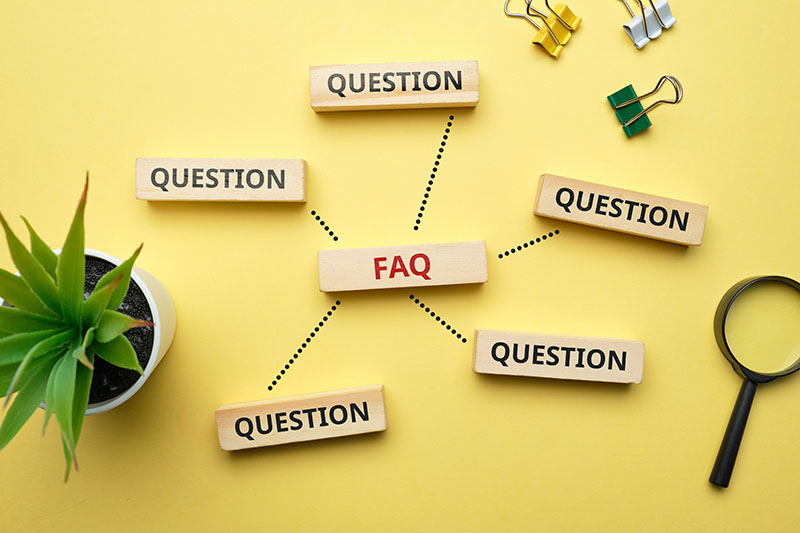Deputyships & Court of Protection
If someone loses mental capacity and they do not have a Lasting Power of Attorney (LPA) or an Enduring Power of Attorney (EPA) in place, a Deputyship Application will need to be made to the Court of Protection to appoint a Deputy on their behalf.
A Deputy is a person appointed by the Court of Protection to manage the affairs of someone who lacks the mental capacity to do it themselves. The Deputy is usually a friend or relative but in some circumstances it could be a professional such as a solicitor or an accountant.
The process of applying for Deputyship is complicated, expensive and can take several months. During that time no one has legal authority to make decisions on your behalf, so we would always recommend putting a Lasting Power of Attorney in place if you can.
If this is not possible as capacity has already been lost, there are two types of deputyship applications:
- A property and affairs Deputy can manage bank accounts on someone’s behalf, pay their care fees or household bills, etc. They can also buy or sell a property for a person to live in.
- A personal welfare Deputy can make decisions about where a person lives, the care they receive and some decisions about medical treatment.
Next steps: get in touch
If you need legal advice about applying to the Court of Protection for a Deputyship or if you have doubts about an existing LPA or EPA, contact our team on: 0800 533 5349 or enquiries@mogersdrewett.com
Meet the team
Frequently asked questions
A Deputyship order gives you the ability to make decisions on behalf of someone who has lost the capacity to care for and make decisions for themselves. You might apply for a Deputyship order when there is no Lasting Power of Attorney (or Enduring Power of Attorney) in place.
A family member or friend of a person who lacks mental capacity can apply to become a Deputy but there is no guarantee that they will be granted the Deputyship. If there are complicated finances, family disputes, or the Court believes being in the care of a professional Deputy to be more beneficial they will appoint someone independent.
Yes. You can make an application to the Court of Protection for the current Deputy to be discharged and replaced with an alternative Deputy.
You might want to apply to change a Deputy if you’re concerned that they’re not making decisions in the best interests of your vulnerable loved one or if they are not getting along with your vulnerable loved one. It’s important that your vulnerable loved one trusts their appointed Deputy to make decisions on their behalf.
The Court of Protection is a Court that can make financial or welfare decisions on behalf of people who don’t have the mental capacity to make those decisions for themselves.
The Court of Protection has the power to:
- Decide whether a person has the mental capacity to make their own decisions
- Appoint Deputies
- Give permission to make one-off decisions on behalf of a loved one or family member
- Make decisions on applications to make statutory wills or gifts
- Make decisions about a lasting power of attorney or enduring power of attorney if doubts about their registration have been raised
The process of being appointed as Deputy can take four to six months. Four forms must be completed, including a capacity assessment by a relevant professional.
The Mental Capacity Act says that a person is unable to make their own decisions if they cannot do one or more of the following four things:
- Understand information given to them
- Retain that information long enough to be able to make the decision
- Weigh up the information available to make the decision
- Communicate their decision – this could be by talking, using sign language or even simple muscle movements such as blinking an eye or squeezing a hand
Every effort should be made to find ways of communicating with someone before deciding that they lack capacity. You may need to get a professional opinion from a general practitioner (GP) or a specialist (consultant psychiatrist or psychologist).





